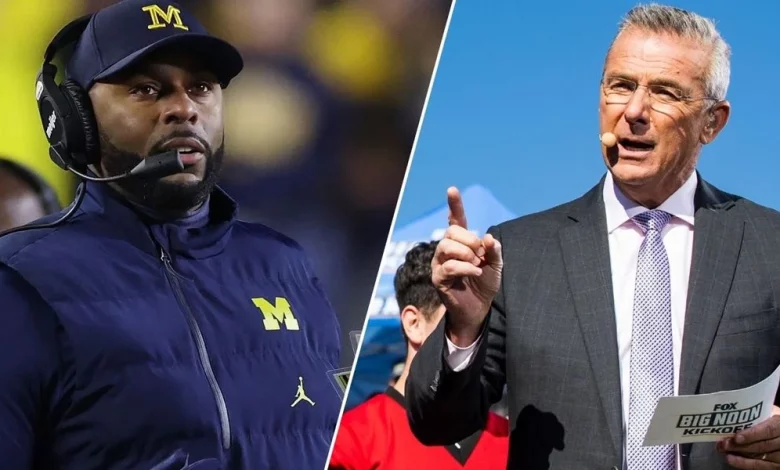Urban Meyer rejects idea of Michigan vacating 2023 national championship amid continued sign-stealing fallout

The 2023 college football season was one of the most controversial in recent memory, and at the center of the storm stood the Michigan Wolverines. After capturing their first national championship since 1997, the program was quickly plunged into scrutiny and scandal due to allegations of an elaborate sign-stealing operation. As the NCAA investigation intensified, the debate around Michigan’s title legitimacy gained momentum. Critics suggested the Wolverines should vacate their championship if the allegations were substantiated. However, one of college football’s most prominent figures, former Ohio State head coach and current analyst Urban Meyer, publicly rejected that notion.
Meyer, a three-time national champion with deep ties to the Big Ten, did not shy away from offering his perspective. Despite his rivalry with Michigan during his tenure in Columbus, Meyer emphasized that stripping Michigan of its 2023 title would set a troubling precedent and further complicate an already fraught issue. His remarks reignited national debate over accountability, fairness, and the scope of punishment in NCAA investigations.
In this in-depth examination, we’ll explore Meyer’s comments, the origins and scope of Michigan’s sign-stealing controversy, and the broader implications of vacating championships in college sports.
The Fallout: Michigan’s Sign-Stealing Scandal
The scandal that engulfed Michigan in 2023 began with whispers of an unusually effective pattern of decoding opponents’ signals. Those whispers turned into a full-blown NCAA investigation by mid-season, centered around Connor Stalions, a low-level staffer allegedly orchestrating an illegal scheme to steal and decode opponents’ play-calling signals.
Reports indicated Stalions had purchased tickets to numerous games involving future Michigan opponents. Video evidence and data analysis pointed to a systematic effort to collect sideline signals using handheld devices, which, if true, would constitute a clear violation of NCAA rules prohibiting in-person scouting and unauthorized recording of opponent signals.
The fallout was swift and brutal. Stalions resigned under pressure, while head coach Jim Harbaugh faced suspension from the Big Ten for the remainder of the regular season. Though Harbaugh was not directly tied to the scheme, the NCAA’s policy of “head coach responsibility” meant he was held accountable for oversight.
Despite the cloud of controversy, Michigan completed an undefeated season and secured the national championship with victories over Alabama in the Rose Bowl and Washington in the title game. The investigation, however, continued, and questions remained unanswered—chief among them: should Michigan’s accomplishments stand if wrongdoing is confirmed?
Urban Meyer’s Take: “Vacating a Title Doesn’t Fix the Game”
In the weeks following the conclusion of the season, Urban Meyer was asked to weigh in on the scandal and Michigan’s championship. Speaking on a national sports network, Meyer, despite his historical rivalry with Michigan, stood firm in his view that vacating the national title was the wrong approach.
“You can’t go back and pretend the games didn’t happen,” Meyer said. “I’m a believer in enforcing rules, but stripping titles doesn’t change the reality on the field. Michigan beat everyone they played, in the playoffs and the regular season. You punish individuals, not an entire roster or fanbase who had nothing to do with it.”
Meyer’s perspective underscores a long-standing tension in how the NCAA enforces its rules. For years, the governing body has stripped wins and championships from programs found guilty of violations after the fact—such as USC losing its 2004 title over Reggie Bush’s improper benefits, or Louisville vacating its 2013 basketball championship due to impermissible recruiting activities. Critics argue these moves do little beyond altering media guides and record books, failing to hold the right people accountable.
For Meyer, the focus should remain on punishing those directly involved. He suggested that if the investigation confirms serious violations, suspensions, financial penalties, and recruiting restrictions are more appropriate responses.
The Precedent Problem: Why Vacating Wins Is Controversial
Urban Meyer is not alone in questioning the usefulness of vacating titles. Historically, such punishments have led to more confusion than closure. Players still have championship rings, fans still remember the celebrations, and the games were still played and broadcast. Stripping a title rarely brings satisfaction to the victims of the infractions, and it certainly doesn’t provide a do-over to the runners-up.
The NCAA has used vacated titles primarily as a symbolic punishment, meant to tarnish the legacy of the programs involved. However, in a competitive sport where millions of dollars and player careers are at stake, many feel the real deterrents are sanctions that directly affect a program’s ability to compete going forward: scholarship losses, postseason bans, and coaching suspensions.
In Michigan’s case, the team played and won the championship games long after the sign-stealing operation was supposedly dismantled. No credible reports have indicated that in-game signal theft occurred during the College Football Playoff. For critics of vacating titles, this makes the case even weaker.
Accountability and Reform: Urban Meyer’s Call for NCAA Clarity
Another key point Meyer raised was the lack of consistency and clarity in NCAA rules enforcement. “The NCAA has to decide if this is about optics or justice,” he said. “If you start vacating championships for this, what about all the other gray areas in recruiting, NIL, transfer tampering?”
Meyer’s comments echo a wider frustration in college football: that rules are inconsistently applied and selectively enforced. Many coaches and administrators believe the NCAA lacks both the speed and structure to effectively police modern college athletics, particularly as the sport enters an era dominated by Name, Image, and Likeness (NIL) deals and massive conference realignments.
Meyer suggested that if the NCAA wants to prevent future incidents like Michigan’s, it needs to create a standardized, transparent system for signal communication—potentially adopting NFL-style helmet radios to eliminate the need for sideline signals altogether.
Reaction Across the College Football Landscape
Meyer’s comments sparked reactions across the sport. Some agreed with his measured stance, arguing that retroactive punishments are largely symbolic and ineffective. Others, including prominent media voices and rival fans, felt Meyer was being too lenient on a direct competitor.
Former coaches and players weighed in as well. Some pointed out that if Michigan did gain a competitive advantage during the regular season through illegal means, then their path to the championship was tainted—even if the games themselves were fairly won.
Still, others emphasized that the NCAA needs to be forward-thinking rather than focused on punitive measures. They echoed Meyer’s call for modernization, including technology to prevent sign-stealing and a greater emphasis on holding individuals—rather than entire programs—responsible.
Jim Harbaugh and Michigan’s Defense
Michigan has, throughout the ordeal, maintained its innocence in terms of institutional knowledge. Head coach Jim Harbaugh has repeatedly stated that he had no awareness of any illegal activities and supports the investigation. University officials have cooperated with both the NCAA and Big Ten inquiries, even as they defended the team’s integrity and accomplishments.
In the aftermath of the championship, Harbaugh chose to leave for the NFL, becoming head coach of the Los Angeles Chargers. While some saw his departure as convenient timing, others viewed it as the natural next step in his career. Either way, it removed the most visible face of the scandal from the program, though the investigation continues.
The Road Ahead: What Happens if the NCAA Rules Against Michigan?
Should the NCAA conclude that Michigan gained a significant and unfair competitive advantage due to the sign-stealing scheme, it will face a difficult choice. If the violations are deemed “egregious,” there will be intense pressure to impose meaningful penalties—especially from schools that believe they were directly impacted.
However, Meyer’s stance suggests a growing divide in how those within the sport view punishment. Rather than erasing history, he and others favor reform, deterrence, and targeted accountability.
Vacating a championship may feel like justice to some, but to others, it’s simply a symbolic gesture that does little to address the root problems.
Meyer’s Message—Focus on the Future, Not Rewriting the Past
Urban Meyer’s rejection of vacating Michigan’s 2023 national title serves as a reminder that college football is as much about narratives and values as it is about rules. His argument is not a defense of cheating, but rather a caution against overcorrecting in a way that creates more confusion than clarity.
Meyer’s core message is clear: the NCAA must modernize its policies, enforce rules consistently, and resist the urge to rewrite history. True accountability, in his view, comes not from stripping trophies, but from building a system where such violations cannot happen again—and if they do, the right people are held responsible.
As Michigan awaits the results of the ongoing investigation, the rest of the college football world watches closely. Whether the Wolverines keep their 2023 title or face unprecedented sanctions, Urban Meyer’s words will likely remain part of the conversation—urging a sport steeped in tradition to look forward instead of only backward.









